Unorthodox Jews: The Secret Worlds of Holy Rollers and Eyes Wide Open | reviews, news & interviews
Unorthodox Jews: The Secret Worlds of Holy Rollers and Eyes Wide Open
Unorthodox Jews: The Secret Worlds of Holy Rollers and Eyes Wide Open
Two new features offer startling, shocking insights into a rarely seen culture
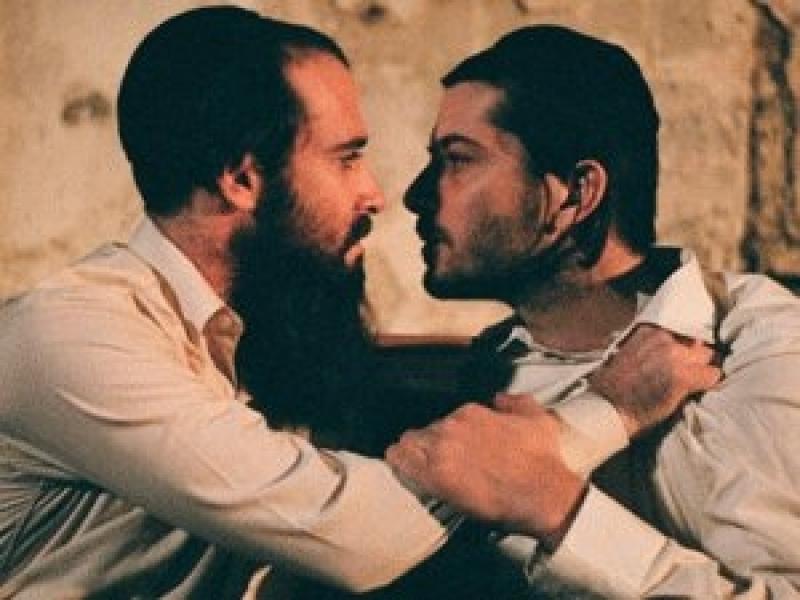
Jews may or may not have built the pyramids, but we know for certain that they built Hollywood. The names of the men who founded MGM, 20th Century Fox and Paramount speak for themselves: Samuel Goldwyn, Louis B Mayer, Marcus Loew, Joseph Schenck, William Goetz, Adolph Zukor et al. It's no wonder, then, that Hollywood history overflows with Jewish filmmakers, actors and producers.
Some traditional religious sects such as the Amish in Pennsylvania (the setting for Peter Weir's 1985 film, Witness) separate themselves from society. Orthodox Jews, by contrast, are largely urban. Growing up in Golders Green – northwest London's Orthodox enclave – with a non-practising Jewish mother, I was always fascinated by the black-clad men and bewigged women who walked among us, yet seemed shrouded in mystery. However, this month sees the two films, opening in Britain and the US respectively, that shed a surprising light on the community: Israeli director Haim Tabakman's dramatic debut feature, Eyes Wide Open, and Kevin Asch's American-set thriller Holy Rollers.
It's not that Orthodox Jews haven't ever made it to the screen before. In fact Hollywood's first synchronised talkie, The Jazz Singer (1927), follows Al Jolson as he attempts to escape from his stiflingly religious family in New York's Lower East Side to become a Broadway performer. There have even been – in the case of Fiddler on the Roof (1971) and Yentl (1983) – a couple of Oscar-winning hit musicals, although they were both set in faraway Europe, in the past.
More recently, Sidney Lumet's A Stranger Among Us (1992) was Witness gone kosher: it starred Melanie Griffith as a cop who goes undercover in an Orthodox Jewish neighbourhood, and develops a crush on a handsome Hasid. Meanwhile, Darren Aronofsky's claustrophobic thriller Pi (1998) had a gang of maths-wizard Hasidim who are trying to crack a code in the Torah, and Josh Appignanesi's 2005 British indie Song of Songs featured incest, bad lighting and a returned son.
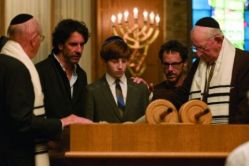 In many of these films – some of which are very good, some not – Orthodox Judaism is depicted as overpowering, exotic, suffocating, repressive, closed, something to run away from. They are a view from outside, rather than from within. It’s a view that isn’t shared by the Coen brothers’ superb A Serious Man (2009), set in a Reform Jewish community in 1960s Minnesota. The film follows a beleaguered physics professor who is desperate for Rabbinic guidance, but it opens with a blackly comic, folkloric prologue set in an early 20th-century Polish shtetl – an illustration, perhaps, of how Jewish humour and mysticism have changed very little in the move from Orthodox to Reform, Old World to New. (Joel and Ethan Coen are pictured above, second left and second right respectively, with cast members).
In many of these films – some of which are very good, some not – Orthodox Judaism is depicted as overpowering, exotic, suffocating, repressive, closed, something to run away from. They are a view from outside, rather than from within. It’s a view that isn’t shared by the Coen brothers’ superb A Serious Man (2009), set in a Reform Jewish community in 1960s Minnesota. The film follows a beleaguered physics professor who is desperate for Rabbinic guidance, but it opens with a blackly comic, folkloric prologue set in an early 20th-century Polish shtetl – an illustration, perhaps, of how Jewish humour and mysticism have changed very little in the move from Orthodox to Reform, Old World to New. (Joel and Ethan Coen are pictured above, second left and second right respectively, with cast members).
What makes Eyes Wide Open and Holy Rollers so interesting is that they are both about contemporary Orthodox Jews doing things which might seem unimaginable to both insiders and outsiders. Eyes Wide Open is a beautifully understated Jerusalem-set drama about a married butcher (Zohar Shtrauss) who falls in love with his attractive, younger male assistant (Ran Danker) – internet buzz has dubbed it "Brokeback Mezuzah". (A Mezuzah is a holy parchment that is traditionally affixed to every doorway in a Jewish household.)
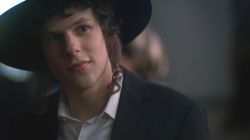 Holy Rollers, meanwhile, stars Jesse Eisenberg (from Zombieland and The Squid and the Whale) as a young New York Hasid who gets caught up in an international ecstasy-smuggling ring (Eisenberg pictured left). The film is based on events in the late 1990s, when American Hasidic Jews were recruited as mules. It's not the first, nor the last time, that Orthodox Jews have become embroiled in drug smuggling, but to see it depicted in a feature film is certainly new. In other words, and perhaps for the first time, they're seen as sexy, sensual, dangerous and getting in trouble, just like everyone else (Below: Eisenberg in trouble in Holy Rollers.)
Holy Rollers, meanwhile, stars Jesse Eisenberg (from Zombieland and The Squid and the Whale) as a young New York Hasid who gets caught up in an international ecstasy-smuggling ring (Eisenberg pictured left). The film is based on events in the late 1990s, when American Hasidic Jews were recruited as mules. It's not the first, nor the last time, that Orthodox Jews have become embroiled in drug smuggling, but to see it depicted in a feature film is certainly new. In other words, and perhaps for the first time, they're seen as sexy, sensual, dangerous and getting in trouble, just like everyone else (Below: Eisenberg in trouble in Holy Rollers.)
Even so, none of the films mentioned here have been made by practising Orthodox Jews, and the actors, too, are generally Reform Jews or non-believers. As Eyes Wide Open's director Haim Tabakman tells me, Orthodox Jews aren't allowed to own televisions or go to the cinema. And while some are making lo-fi films, they're faced with a particularly difficult hurdle. "They are not allowed to show women and men together on the screen," says Tabakman. "So if a woman is making a film, she has to only use women; if men are making a film, they can only use men. You can't even let a women pass in the frame. And of course, if they want to be subversive, they have to be very clever about it."
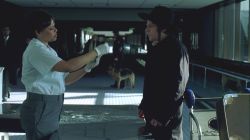 Therein lies the rule broken by the Hasidic actor Abe Karpen, who in 2008 dropped out of the film New York, I Love You due to pressure from his community. Karpen – who hails from Williamsburg, Brooklyn – was set to play Natalie Portman's husband in one of the film's 12 "short stories" about the Big Apple. "They [the Rabbis] didn't like the idea of a Hasidic guy playing in Hollywood,” he explained at the time. "The Rabbi called me over... and said in order for me to keep my kids in the school, I have to do what they tell me and back out.” Isaac Weinberger, a Hasidic activist, went further, saying, "To be in a movie is the worst thing. It's a shame for any Hasid.” Before resigning, Karpen had already refused to hold Portman’s hand in a scene – something that Hasids are not allowed to do in public, even with their actual spouses. Two years later, one assumes that the man who got close to being the world’s first Orthodox Jewish movie star has gone back to selling cabinets, his stab at Hollywood a distant dream.
Therein lies the rule broken by the Hasidic actor Abe Karpen, who in 2008 dropped out of the film New York, I Love You due to pressure from his community. Karpen – who hails from Williamsburg, Brooklyn – was set to play Natalie Portman's husband in one of the film's 12 "short stories" about the Big Apple. "They [the Rabbis] didn't like the idea of a Hasidic guy playing in Hollywood,” he explained at the time. "The Rabbi called me over... and said in order for me to keep my kids in the school, I have to do what they tell me and back out.” Isaac Weinberger, a Hasidic activist, went further, saying, "To be in a movie is the worst thing. It's a shame for any Hasid.” Before resigning, Karpen had already refused to hold Portman’s hand in a scene – something that Hasids are not allowed to do in public, even with their actual spouses. Two years later, one assumes that the man who got close to being the world’s first Orthodox Jewish movie star has gone back to selling cabinets, his stab at Hollywood a distant dream.
So the genuine Orthodox experience may never be brought to the screen, but Eyes Wide Open, at least, gets very close. Indeed, the film’s specificity is what makes it so emotionally poignant. While researching the film, the director met several gay Orthodox Jews. “The people I talked to were living a double life, which means that they kept it a secret from their families,” he says. “They give themselves all kinds of justifications.” Eyes Wide Open explores the limits of such justifications: unlike Ariel, the saintly Hasid in A Stranger Among Us – who is able to resist Melanie Griffith’s feminine wiles – love and lust prove to be too great a match for Tabakman’s characters.
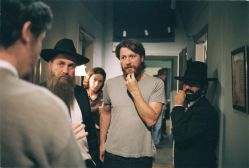 It's not the first time that the subject has been tackled on celluloid. In 2001, Sandi Simcha DuBowski made Trembling Before G-d (among some Jews, writing "God" is prohibited), a sensitive documentary about gay and lesbian Orthodox Jews struggling to heal the chasm between their faith and their sexuality. Homosexuality is mentioned twice in the Torah, in an extremely negative light. "If a man lies with a male as with a woman," reads Leviticus 20:13, "both of them have committed an abomination; they shall surely be put to death; their blood is upon them."
It's not the first time that the subject has been tackled on celluloid. In 2001, Sandi Simcha DuBowski made Trembling Before G-d (among some Jews, writing "God" is prohibited), a sensitive documentary about gay and lesbian Orthodox Jews struggling to heal the chasm between their faith and their sexuality. Homosexuality is mentioned twice in the Torah, in an extremely negative light. "If a man lies with a male as with a woman," reads Leviticus 20:13, "both of them have committed an abomination; they shall surely be put to death; their blood is upon them."
Among Reform Jews, this makes being gay difficult enough; showing two Orthodox Jewish men in the act of making love, therefore, is extremely brave – particularly as Tabakman (pictured left on the set of Eyes Wide Open) eschews any sense of melodrama or titillation. "It's the way I look at things – the tone that I like: take extreme things, but try to portray them in a more gentle way," he says.
Thanks to the fact that having a computer is not forbidden, the director is confident that Orthodox Jews – in particular, ones struggling with their sexuality – will be able to watch his film in their own homes. "I'm sure they will," he says, "because you can already download it on the internet. This is the only way they can see it." Whether it will inspire them to pick up a camera, however, remains to be seen. Until then, the likes of Eyes Wide Open and Holy Rollers are as close as cinema can get to the heart of this closed community.
Explore topics
Share this article
Add comment
The future of Arts Journalism
You can stop theartsdesk.com closing!
We urgently need financing to survive. Our fundraising drive has thus far raised £49,000 but we need to reach £100,000 or we will be forced to close. Please contribute here: https://gofund.me/c3f6033d
And if you can forward this information to anyone who might assist, we’d be grateful.

Subscribe to theartsdesk.com
Thank you for continuing to read our work on theartsdesk.com. For unlimited access to every article in its entirety, including our archive of more than 15,000 pieces, we're asking for £5 per month or £40 per year. We feel it's a very good deal, and hope you do too.
To take a subscription now simply click here.
And if you're looking for that extra gift for a friend or family member, why not treat them to a theartsdesk.com gift subscription?
more Film
 The Mastermind review - another slim but nourishing slice of Americana from Kelly Reichardt
Josh O'Connor is perfect casting as a cocky middle-class American adrift in the 1970s
The Mastermind review - another slim but nourishing slice of Americana from Kelly Reichardt
Josh O'Connor is perfect casting as a cocky middle-class American adrift in the 1970s
 Springsteen: Deliver Me From Nowhere review - the story of the Boss who isn't boss of his own head
A brooding trip on the Bruce Springsteen highway of hard knocks
Springsteen: Deliver Me From Nowhere review - the story of the Boss who isn't boss of his own head
A brooding trip on the Bruce Springsteen highway of hard knocks
 The Perfect Neighbor, Netflix review - Florida found-footage documentary is a harrowing watch
Sundance winner chronicles a death that should have been prevented
The Perfect Neighbor, Netflix review - Florida found-footage documentary is a harrowing watch
Sundance winner chronicles a death that should have been prevented
 Blu-ray: Le Quai des Brumes
Love twinkles in the gloom of Marcel Carné’s fogbound French poetic realist classic
Blu-ray: Le Quai des Brumes
Love twinkles in the gloom of Marcel Carné’s fogbound French poetic realist classic
 Frankenstein review - the Prometheus of the charnel house
Guillermo del Toro is fitfully inspired, but often lost in long-held ambitions
Frankenstein review - the Prometheus of the charnel house
Guillermo del Toro is fitfully inspired, but often lost in long-held ambitions
 London Film Festival 2025 - a Korean masterclass in black comedy and a Camus classic effectively realised
New films from Park Chan-wook, Gianfranco Rosi, François Ozon, Ildikó Enyedi and more
London Film Festival 2025 - a Korean masterclass in black comedy and a Camus classic effectively realised
New films from Park Chan-wook, Gianfranco Rosi, François Ozon, Ildikó Enyedi and more
 After the Hunt review - muddled #MeToo provocation
Julia Roberts excels despite misfiring drama
After the Hunt review - muddled #MeToo provocation
Julia Roberts excels despite misfiring drama
 London Film Festival 2025 - Bradley Cooper channels John Bishop, the Boss goes to Nebraska, and a French pandemic
... not to mention Kristen Stewart's directing debut and a punchy prison drama
London Film Festival 2025 - Bradley Cooper channels John Bishop, the Boss goes to Nebraska, and a French pandemic
... not to mention Kristen Stewart's directing debut and a punchy prison drama
 Ballad of a Small Player review - Colin Farrell's all in as a gambler down on his luck
Conclave director Edward Berger swaps the Vatican for Asia's sin city
Ballad of a Small Player review - Colin Farrell's all in as a gambler down on his luck
Conclave director Edward Berger swaps the Vatican for Asia's sin city
 London Film Festival 2025 - from paranoia in Brazil and Iran, to light relief in New York and Tuscany
'Jay Kelly' disappoints, 'It Was Just an Accident' doesn't
London Film Festival 2025 - from paranoia in Brazil and Iran, to light relief in New York and Tuscany
'Jay Kelly' disappoints, 'It Was Just an Accident' doesn't
 Iron Ladies review - working-class heroines of the Miners' Strike
Documentary salutes the staunch women who fought Thatcher's pit closures
Iron Ladies review - working-class heroines of the Miners' Strike
Documentary salutes the staunch women who fought Thatcher's pit closures
 Blu-ray: The Man in the White Suit
Ealing Studios' prescient black comedy, as sharp as ever
Blu-ray: The Man in the White Suit
Ealing Studios' prescient black comedy, as sharp as ever

Comments
...